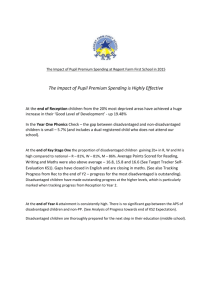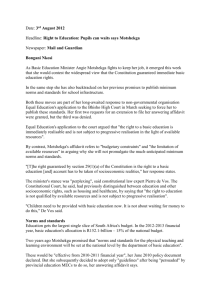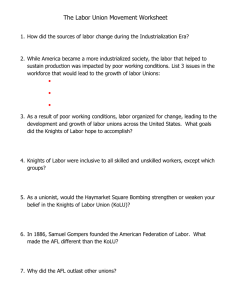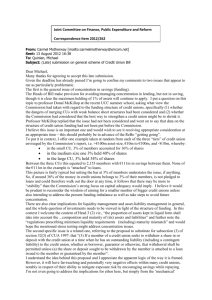The Big Read:Wrecking ball fixes nothing
advertisement
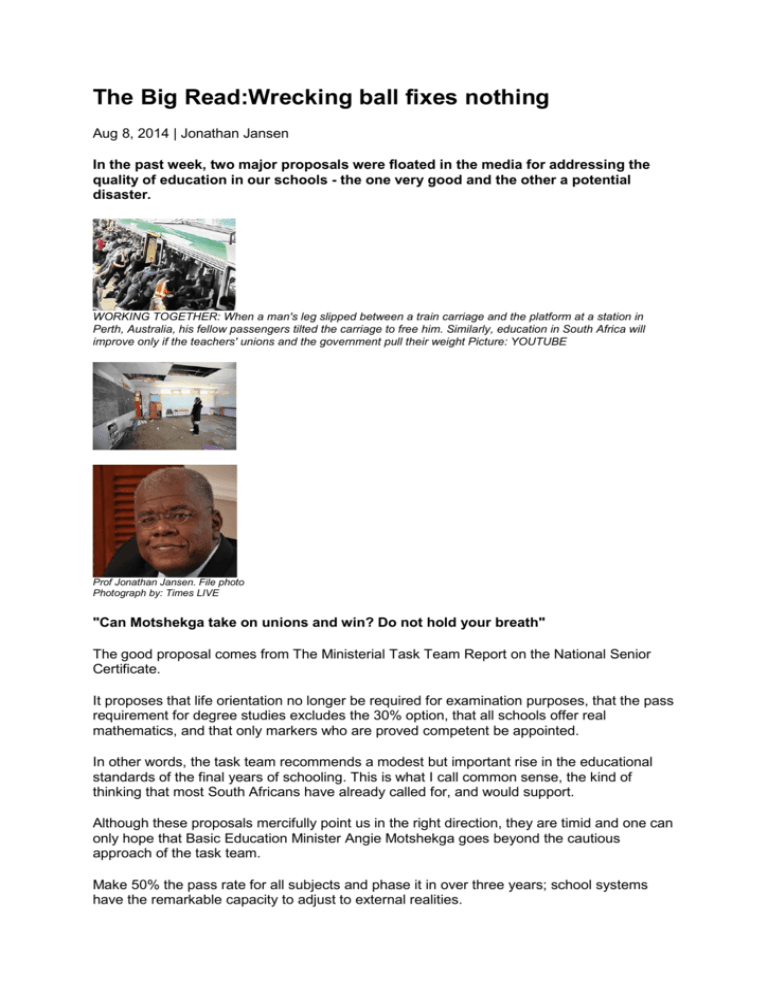
The Big Read:Wrecking ball fixes nothing Aug 8, 2014 | Jonathan Jansen In the past week, two major proposals were floated in the media for addressing the quality of education in our schools - the one very good and the other a potential disaster. WORKING TOGETHER: When a man's leg slipped between a train carriage and the platform at a station in Perth, Australia, his fellow passengers tilted the carriage to free him. Similarly, education in South Africa will improve only if the teachers' unions and the government pull their weight Picture: YOUTUBE Prof Jonathan Jansen. File photo Photograph by: Times LIVE "Can Motshekga take on unions and win? Do not hold your breath" The good proposal comes from The Ministerial Task Team Report on the National Senior Certificate. It proposes that life orientation no longer be required for examination purposes, that the pass requirement for degree studies excludes the 30% option, that all schools offer real mathematics, and that only markers who are proved competent be appointed. In other words, the task team recommends a modest but important rise in the educational standards of the final years of schooling. This is what I call common sense, the kind of thinking that most South Africans have already called for, and would support. Although these proposals mercifully point us in the right direction, they are timid and one can only hope that Basic Education Minister Angie Motshekga goes beyond the cautious approach of the task team. Make 50% the pass rate for all subjects and phase it in over three years; school systems have the remarkable capacity to adjust to external realities. Drop life orientation altogether - when you make the subject non-examinable, it loses all meaning for students. Rather develop a "life orientation perspective" in the teaching of all subjects. Fix the root of the mathematics problem, which is the shaky foundations of numeracy in the lower grades. Simply requiring schools to offer maths does not mean more than a few will take it and pass it in the disadvantaged schools. Here, nevertheless, is a test of political courage for Motshekga. Will she be able to take on the teachers' unions and insist, for example, that every marker be competent in the subject matter and be selected on that basis alone? Having observed these kinds of political entanglements from close quarters, I advise that you do not hold your breath. The disastrous proposal comes from the red-hot MEC for education in Gauteng, Panyaza Lesufi. I share his passion for equity in the schools system; it is simply unacceptable to have such visible inequalities between rich and poor schools. We should contemplate radical measures to change that, urgently. But merging two schools so that they have one headship and one bank account, and shared facilities, such as laboratories, will have only one effect - it will drop the quality of both schools in the partnership. Why? Because schools are fragile organisations, as we reported in our research for the book Diversity High: Class, colour, character and culture in a South African high school. So how does this happen? The middle-class children leave, white and black. In their calculation, the parents pay for quality and, the truth is, on balance most of these well-off public schools run on private monies, not state funding. Expect a small then rapid drift of these students to the burgeoning private sector and to schools unaffected by the mergers. You would then be left with a clientele that can't raise funds to maintain expensive sports fields, run labs or pay additional teachers. This is what Lesufi in his political zeal cannot see, and for which he will not have to be accountable when the disaster strikes - remember outcomes-based education? Then there are practical issues. Try to share a science laboratory between two schools. As a teacher I had to run my classes before and after school to enable children of one school to do the full complement of biology practicals in a disadvantaged school. With Lesufi's plan, there are no logistics to think about, let alone the doubling of costs for dry and wet materials, or maintenance and lab assistants. Consider libraries and sports fields and the challenge is insurmountable. The way to establish quality education for all our children is to find the money and invest the funds in disadvantaged schools to build and maintain quality infrastructure while attracting the best teachers from all our schools. Do not break down schools that work, white or black; they need support not pressure, or they, too, will collapse. There are no shortcuts to building quality schools. I do not expect the plan for school mergers to work. Apart from the inevitable legal challenges that will follow, it is not in the interests of the political classes. I cannot imagine a single member of the cabinet, or Lesufi himself, wanting his children, who sit in privileged schools, merging with a poor school with one bank account. ~oOo~
